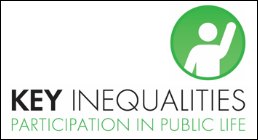Statement on Key Inequalities in Participation in Public Life

25/10/2018
Commission statement on participation in public life in NI.
“It is important that the people who make the major decisions that affect our lives are representative of all of us who live in Northern Ireland,” Eileen Lavery, Head of Advice, Policy and Investigations at the Equality Commission for Northern Ireland said today.
The Commission has produced a statement which identifies inequalities in the participation in public life by people from different equality groups in Northern Ireland.
“Full participation across the range of public life is important to improve decision making and deliver outcomes which better reflect the interests and needs of everyone in our community,” Eileen Lavery said.
“There is still a lot to be done before this can be achieved. There are many areas where people from all parts of our society could play a fuller part in decision making, if given the opportunity and encouragement to participate. This includes in politics, as board members on public bodies and also at community level, such as membership of community associations, serving on Boards of Governors of schools or colleges, and through membership of other public institutions.”
“The barriers which are limiting diversity in these bodies are varied, but many are, sadly, all too familiar,” Eileen Lavery said. “The Statement reflects on the underlying assumptions which, often unthinkingly, still persist and can lead to people selecting or electing only people who reflect their own characteristics and background. This lack of diversity in those who currently participate in public life can also act as a disincentive to people from many groups who can feel that these institutions are ‘not for the likes of them’. These are attitudes which must be challenged and changed by those on both sides of the issue – those applying and those making appointments.”
“This Statement is only a snapshot of the position. There is a clear absence of data in most of the areas considered to constitute public life. It is important that all public bodies improve the data they routinely collect and publish and take steps to improve diversity in all areas of public life.
“More women, more disabled people and more people from an ethnic minority background should be appointed if we are to accurately reflect our community and provide positive roles models for others to follow,” Eileen Lavery said.
Notes for editors
Key findings in the Equality Commission report on inequalities include:
There is an under-representation of persons with a disability in applications and appointments to government public appointments.
Little improvement has been made in terms of the levels of appointments of persons with disabilities being made to government public appointments and within government public appointments over the period 2006 – 2016 (2% 2006 and 3% in 2016) There is a consistent underrepresentation of persons with a disability as applicants to government public appointments ranging from 2% to 5% annually.
Women are underrepresented within elected positions in Northern Ireland.
In elected positions - MPs (22%), MLAs (30%), Local Councillors (25%), and Council Mayor/Chairpersons (23%). Within government public appointments - in government public appointments (41%) and as publicly appointed chairpersonships (24%).
There are no elected representatives from ethnic minority backgrounds.
Currently, there is no political presence in terms of ethnic minorities within the Northern Ireland Assembly, and only one elected councillor in all eleven Northern Ireland local Councils.
Barriers to participation for all groups include:
- Negative perceptions / stereotypes which exist about the skills, abilities and experience of certain equality groups.
- Appointment processes can place women and other under-represented groups at a disadvantage - selection processes and application forms asking for formal qualifications and previous board experience - the use of jargon in the selection processes.
- The reconciliation of family and working life represents a significant barrier for women.
- The cost of participation may limit the opportunities to participate fully in public life for a range of equality groups.
- A lack of engagement and outreach by public and political institutions towards some equality groups and a lack of support, development skills, education, training, or capacity building.
- Certain equality groups may lack confidence and trust in politicians and the public bodies.
- Physical and communication barriers may also inhibit the participation of certain equality groups. Poor provision of accessible travel systems and accessible buildings can limit attendance.